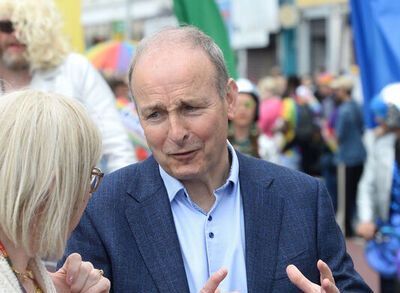By Peter McDermott
Thomas E. Kennedy decided at age 17 that when he was older he should be a writer.
Now at 66, with 11 published novels to his name, he's become an overnight success.
Jonathan Yardley said in a recent review in the Washington Post: "He is a writer to be reckoned with, and it's about time the reckoning got underway in the country of his birth."
Junot Diaz, one of the nation's top novelists, has said of Kennedy's recently published novel: "'In the Company of Angels' is as elegant as it is beautiful, as important as it is profound. A marvel of a read."
"It's unsettling, because you become accustomed to being one thing, and maybe you're another," said Kennedy of his transformation from a long-time small-press author to one who's gotten a six-figure two-book deal with Bloomsbury in New York, his native city.
"It's what I wanted all along, but I had given up the hope," said the novelist who settled in Denmark in 1976, and got married and raised two children there.
The new chapter in his career has some asking what might have been if he hadn't left the United States. Would he have become successful much earlier in his career? He doesn't see it in those terms, though. He could just as easily given up writing if he'd stayed.
"In some ways, I think, part of what happened to me was becoming an expatriate and living in another country," said Kennedy, who grew up in Elmhurst, Queens.
He's all too aware of twists of fortune. For one thing, he dropped out of college, volunteered for the army and was discharged at age 20. "By dumb luck, I avoided it [the Vietnam War]," he said. "I started in the ROTC at CCNY and if I had stayed with that I would have graduated in 1965 as an infantry lieutenant. The average life of the infantry 2nd lieutenant was about eight weeks on the battlefield."
And compared to the literary career of his father, who was vice-president of the Long Island City Savings Bank, Kennedy's has been prolific: over the past three decades, he's had more than 20 volumes published -- novels, collections of stories and works of literary criticism.
"He really wanted to be published and he was very encouraging to me when I decided I wanted to write," he said of Kennedy senior. "In all his life, he only ever published two poems: one in the New York Times and one in the Catholic Messenger."
Internal life
His mother, who was a primary school teacher, was also supportive. Her forebears were from Alsace-Lorraine. "So she was French and partially German," Kennedy said. One of his ancestors escaped conscription ahead of the Franco-Prussian War and landed in Brooklyn in 1869.
The fact that his grandmother's name was Ryan complicated the roots search on the paternal side of the family. "The only thing we know is that they're from Tipperary," he said. "But when I tried to trace it, it seems that every other person there is either a Kennedy or a Ryan."
As it happens, his long-time day job with the Danish Medical Association brought him in contact with its Irish equivalents. "I always felt at home in Ireland," he said.
Literature was another connection. He began his long engagement with James Joyce's work as a young man. But before that, when he was 15, he asked his father for something to read. He gave him a copy of Dostoyevsky's "Crime and Punishment." Life was never the same again.
"In fiction I could approach an understanding of life. I guess there was a schism between my internal life and my external life," he said. "Somehow that problem was solved for me by reading fiction.
"To me, Joyce in 'Ulysses' depicted the processes of human thought, and I had never seen it that way before," Kennedy added. "I saw that I was normal."
A chance encounter of sorts led to a breakthrough in Ireland early in the 21st century. "I had had an interview in a French magazine and in it I talked about my plans to write these four 'Copenhagen' novels," he said. "There was also a Galway poet in the same issue. About 20 copies of it found their way to Kenny's bookshop in Galway, which is unfortunately closed now."
Roger Derham, the head of Wynkin De Worde publishing house in that city, picked up a copy and read the interview. "He was intrigued. He liked the manuscript that was sent to him and proposed to do all four," said Kennedy, who has a 30-year-old son, a graduate student in history, and a 28-year-daughter, who gave birth to a baby boy late last year.
Victims' stories
Kennedy had, by that point, several novels published with small presses in the United States, but "The Copenhagen Quartet" gave him a profile in Ireland and after that he became better known in Denmark and Europe generally.
Bloomsbury is publishing the third, which was previously known as "Mr. Greene's Summer," a love story involving a refugee from Pinochet's Chile and a woman who has escaped a violent marriage.
For his job, Kennedy had edited the psychiatric manual of the Torture Rehabilitation Center and met some people who had been tortured in Chile. "To listen to the details was really horrifying," he said.
The victims' stories haunted him and he wrote a short story thinking it might ease their effects. "Then I thought it might be unethical in some way," he said. "So I brought it to the director of the center. She was extremely encouraging and urged me to go on writing.
"I didn't set out to write a political book or even a particularly historical book," Kennedy said. "What I really wanted to do was to explore the lives of two people who have experienced great pain."
When asked if writing is therapeutic in a more general sense, and if the fiction writer, as is generally believed, is dealing with issues from his childhood or later on, Kennedy replied that his father's death at the early age 58 was a signature event in his life. "You think that a 20-year-old can deal with that. But it took me a long time," Kennedy said. "In some ways, I never knew my father as an adult and that had a cataclysmic effect on my life."
Kennedy, whose three older siblings live in the U.S., two of them in Queens, is a regular visitor to this country. He teaches a course in the MFA program at Farleigh Dickinson University. But the divorced novelist is happy living in Scandinavia.
"I love Copenhagen," he said. "My children are there; my grandchild is there."
He enjoys the change of seasons in the Danish capital, which is what links the otherwise unconnected novels of the "Copenhagen Quartet."
"'In the Company of Angels,' though a dark book, is set in the summer when the birds begin to sing at 2:30 in the morning," he said. "The sun comes out at 3 a.m."
Coming into the light, he said, is a common theme in his novels, which differ greatly in style. "In the Company of Angels" is a favorite, but he added that all were his favorites for various reasons.
"My mother used to say, if someone asked her which of her children was her favorite: 'The one who's sick and the one who's away,'" Kennedy said. "Maybe my favorite is the one that I'm working on at the moment."
For more on Thomas E. Kennedy, go to his website www.thomasekennedy.com.










